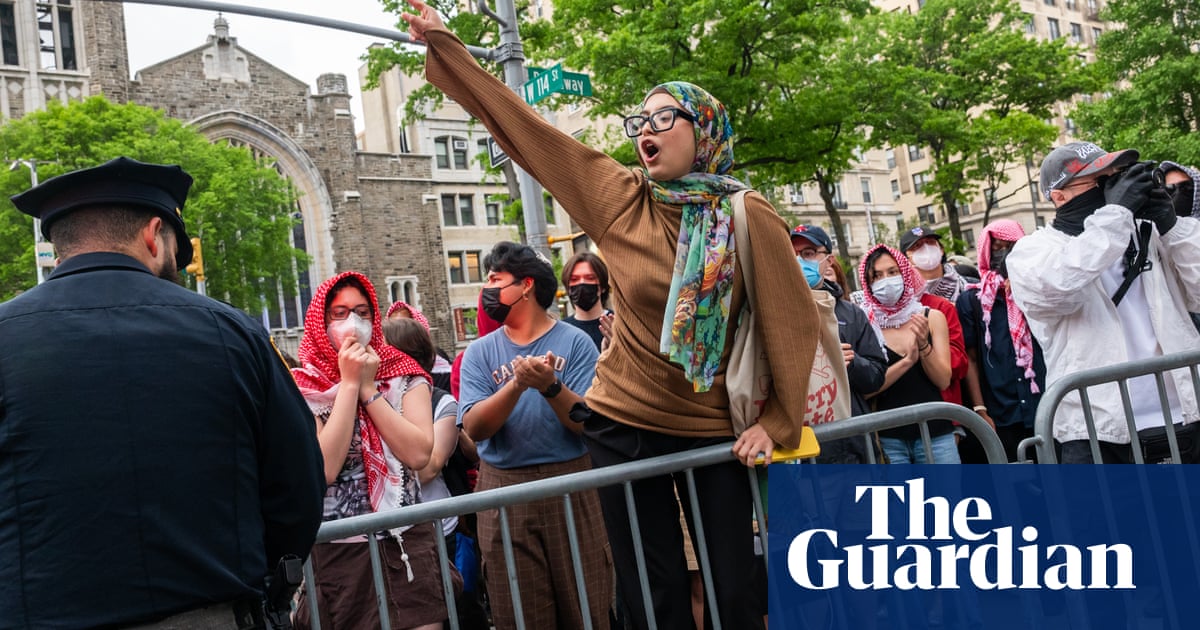Columbia University asked the New York police department to help clear pro-Palestinian activists after dozens of protesters occupied parts of the main campus library on Wednesday.
Claire Shipman, the university’s acting president, said in a statement that protesters had refused to leave the building despite being warned that a failure to comply would result in disciplinary action and possibly arrest for trespassing.
“Due to the number of individuals participating in the disruption inside and outside of the building, a large group of people attempting to force their way into Butler Library creating a safety hazard, and what we believe to be the significant presence of individuals not affiliated with the University, Columbia has taken the necessary step of requesting the presence of NYPD to assist in securing the building and the safety of our community,” Shipman said in the statement.
“Sadly, during the course of this disruption, two of our Columbia Public Safety Officers sustained injuries during a crowd surge when individuals attempted to force their way into the building and into Room 301. These actions are outrageous,” she wrote.
In an interview with alocal NBC affiliateon Wednesday evening, the New York mayor Eric Adams said the police department was “on its way” to the campus.
“We are in engagement with the college. They have asked for our help, and the NYPD is en route,” Adams said, calling the protest “unacceptable”.
At 6pm EST, students received an alert saying the library was closed and the area “must be cleared”.
The New York governorKathy Hochul, a Democrat, said she had been briefed on the situation and was “grateful to public safety officials for keeping students safe”.
“Everyone has the right to peacefully protest. But violence, vandalism or destruction of property are completely unacceptable,” she said in a statement.
Images shared on social media by the campus protest movement Columbia University Apartheid Divest (CUAD) showed masked protesters, many wearing the keffiyeh, a black and white scarf that has long been a symbol of Palestinian liberation, flooding a room inside Butler library.
Some stood on desks with bullhorns, while others unfurled a sign that read “strike for Gaza” and distributed pamphlets calling on the university to “divest” from funds and businesses that activists say are profiting from Israel’s invasion of Gaza. They also held up a “FreeMahmoud Khalil” banner with an image of the recent Columbia graduate and Palestinian activist who has been held in Ice custody since his arrest in March.
In a statement posted on X, protesters confirmed that they had refused to show their IDs and that some had sustained injuries in the skirmish with the public safety officers.
“We will not be useless intellectuals,” protesters said in a statement. “Palestine is our compass, and we stand strong in the face of violent oppression.”
The standoff comes at a fragile moment for the university, as it faces a crackdown by the Trump administration over its response to student protests against the war in Gaza last spring. The administration has accused the university of failing to protect Jewish students from antisemitism on campus and canceled $400m in federal research funding from the school.
On Tuesday, the university announced a round of layoffs as a result of the cuts. University officials said they were working with the Trump administration in the hopes of getting the funding restored.
Last spring, protesters set up an encampment and seized Hamilton Hall, a campus building, which led to dozens of arrests and inspired similar demonstrations at universities across the country.
Since then, the university has undergone a series of leadership changes. In March, the interim president of Columbia stepped down after agreeing to nearly all of the Trump administration’s sweeping demands – a decision that outraged faculty and critics who said the university had sacrificed its independence and academic freedom.
